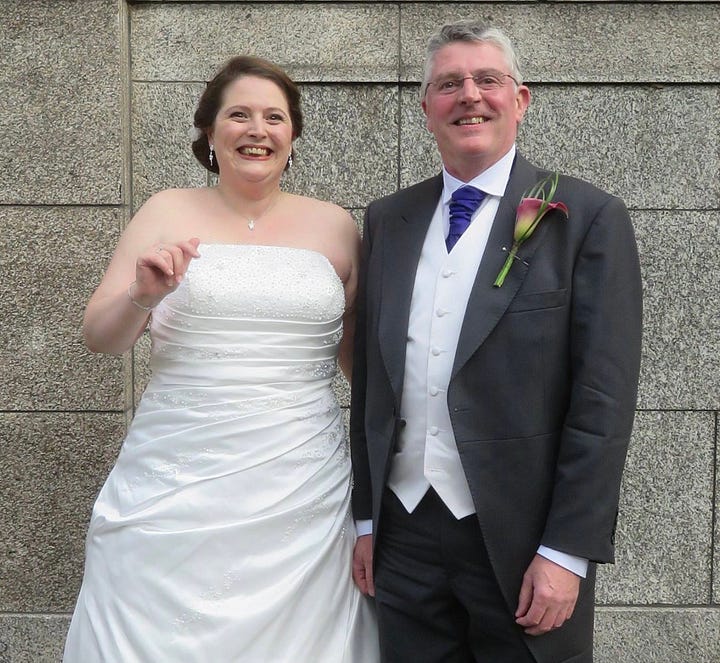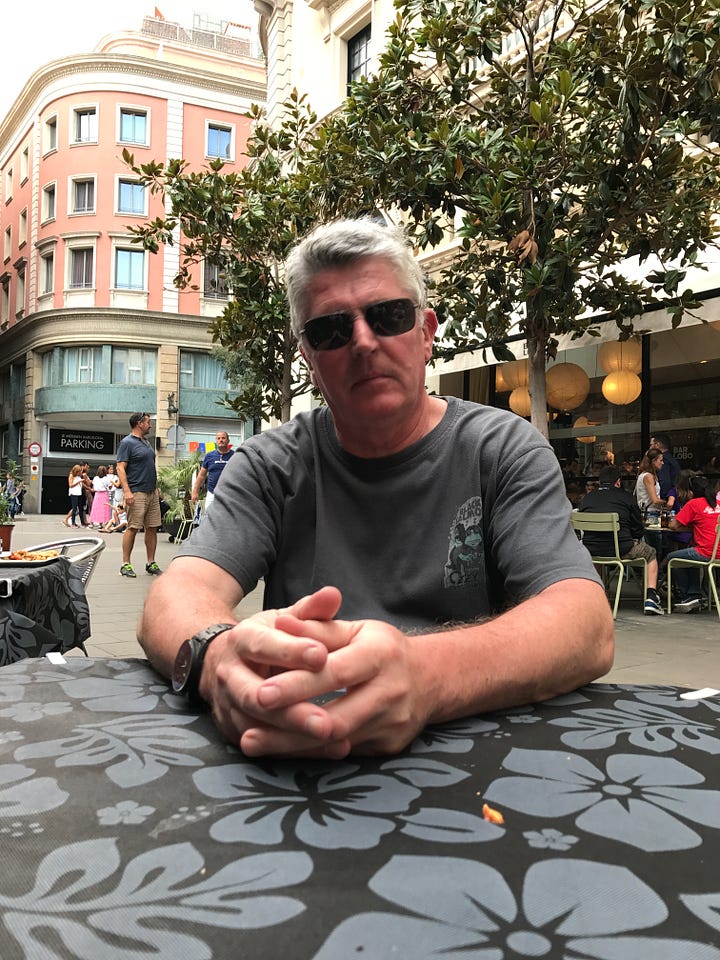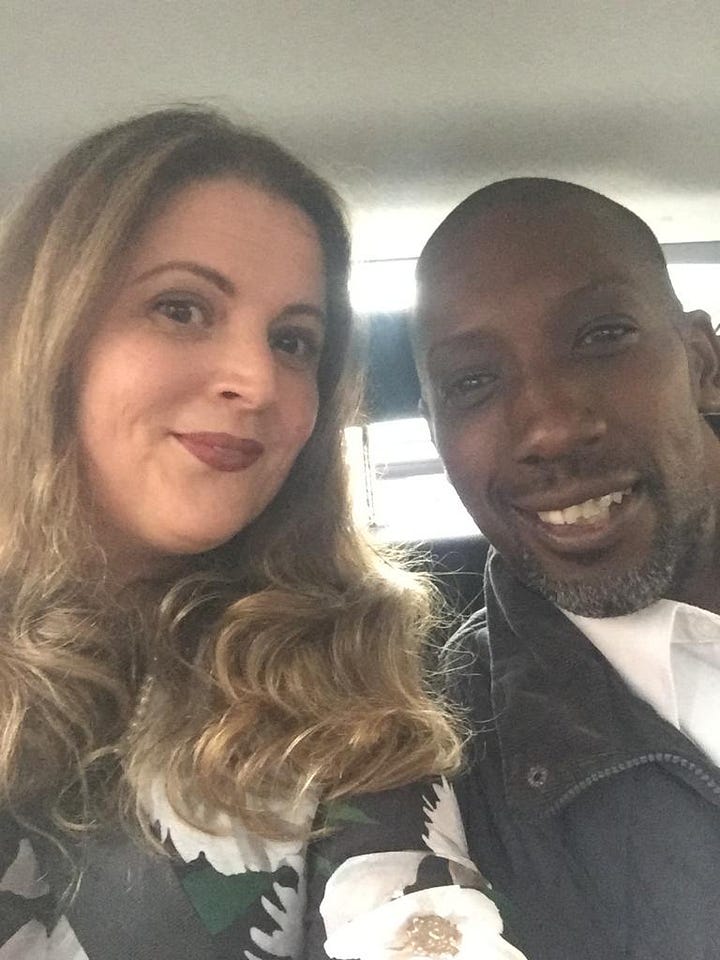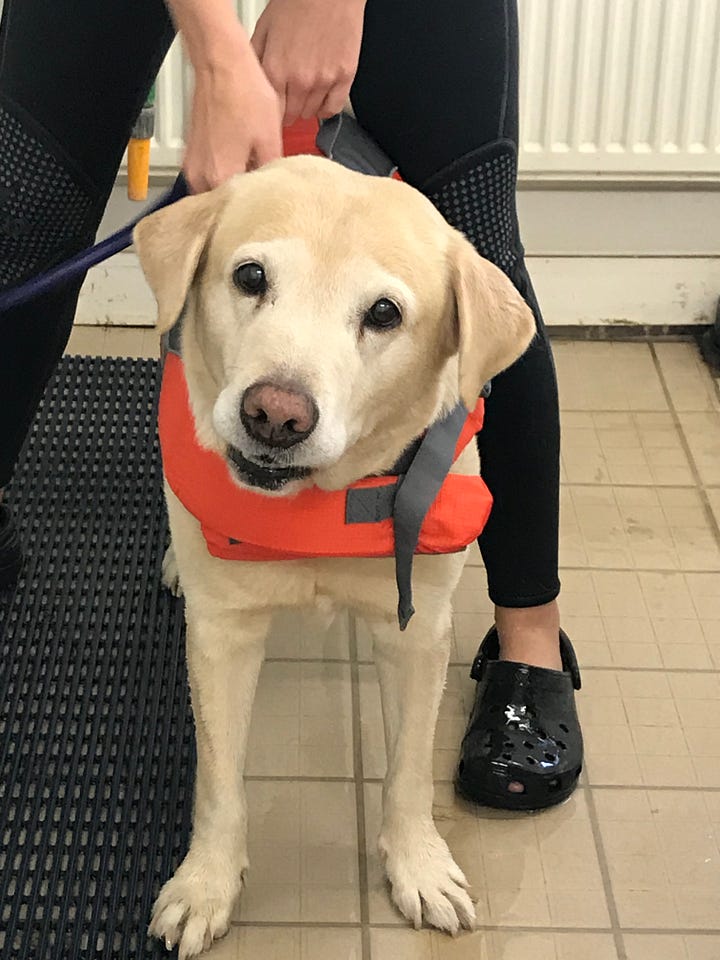If you haven’t already please subscribe to, and share, my Substack. My weekly ramblings are free. I hope my pondering resonates with others and your subscriptions have kept me writing over the last 10 months. Thank you.
I have added a full transcription as usual:




Thank you for listening to my second podcast, like the last it serious, maybe even difficult. Before I get stuck in I will apologise for any background noises, errors or other kinks. I am beginning to get there/here but I still find glitches. This will be my fourth attempt, The first one I had stopped and started, got to the end listened back to realise I had recorded over half of it, second attempt the metronome could be heard, a real distraction, third attempt just didn’t work. Here goes fourth time lucky.
Why is this serious? It is me pondering while I ramble around my own experiences of grief. My last podcast was raw about the death of my daughter. I am hoping this one does start showing that grief is not the end of the loss journey. A very old adage but there is a light, a candle at the end of even the darkest, dampest, longest tunnel of grief.
I am now beginning to accommodate my grief following John, my husband, and Sarah, my daughter deaths. Nonetheless the knot of grief will always be within me. The last few years have also made me think about the different grief I have experienced. This may seem self-indulgent but it is not meant to be. I hope my experiences resonate with someone somewhere, and if they do, maybe helps just a little bit.
Grief is a complex and challenging beast to pin down. It is something I have become very experienced in over the last few years. I could say I have become an expert, BUT only in my own grief. I can recount my experiences because only I know how I feel, how I have felt over the last few years and the potential longer-term impact of each loss on me and my world. I can never tell anyone else how they should feel or how they should act.
Nonetheless, I hope that recounting my experiences can help others navigate the grief journey. We take different routes at different times. The common theme is that it is not easy and grief hurts, but the journey becomes more manageable, and the hill becomes less steep and less painful to climb.
I suppose the significant losses in my life started with my father in August 1994. I would say that was normal grief. We were on holiday in Puerto Pollensa in Majorca we had a great time. I can remember being in the sea the day before we were due to come home. I felt a shiver, like someone had walked across my grave. I think it was about the time my father fell out of bed and was rushed to hospital, but that may be wishful thinking.
When we landed at Stansted Airport, my phone rang as soon as I turned it on. It was my father's partner, I needed to come immediately. I picked up my car from home and drove up the M11, leaving John and the kids at home. I remember listening to There Will Always Be Tomorrow by Gloria Estefan and thinking that's not true.
We all managed to say goodbye, my brother, my sister and I and although, he was only 68 when he died, there was something normal, calm and natural about his death. It was heartbreakingly sad but not traumatic nor unexpected. I would say my grief for my father really was normal if such a thing. I was very sad over the next few weeks, with tears often bubbling up and escaping when I thought about him. I missed him dreadfully and thought about things we hadn't said or done. I still miss him nearly 30 years on and wonder if he would be proud of me. I still occasionally ask him.
My next experience of grief was incredibly different: my mother. The whole episode was traumatic brutal, but tinged with a feeling of relief. It was over. She lived a life of division, despair, damage and missed opportunities. If she had allowed herself, she could have had everything. She was a highly intelligent and successful lawyer, graceful beautiful, but one of the most damaged and purposely damaging people you could meet.
In March 2003, I had just finished a very challenging meeting in London. When I turned my phone back on John, my husband rang with the words, "She's finally done it". I didn't immediately grasp what he was saying until, after a pause, he said, "the police have been trying to get hold of you. She's committed suicide".
It was her 8th attempt. She never meant to die. It was a way of getting us to take notice and toe the line. If we didn't, she would call an ambulance herself. Sarah and I had to go and meet an Inspector from Snow Hill Police Station at her flat in the Barbican. The inspector was very professional from the start but distant. He walked us along the route she took to the top floor of her block from where she fell. I realised later he was checking I wasn't involved in her death. Once he checked my alibi and was satisfied, his manner changed. The professional persona slipped to be replaced by genuine empathy. I will always be grateful to him. He made Sarah and I feel much calmer, even at ease, in a bizarre situation. I understood his initial thoughts when we went back to her flat. Mother had scrawled insults and other things about us on bits of paper stuck on the wall, in her diary and other places, including how we would 'be the death of her'. The police had searched her flat for details.
Sarah and I identified her body at the morgue. She had a bruise on one side of her face, but otherwise, she looked more peaceful than I had seen in a very long time. Under the purple velvet cover, you could see her broken body.
The inquest was a few months later. The coroner, taking into account her history, my brother and my statements, verbal and written, recorded a verdict of misadventure rather than suicide. You could argue that the inquest stalled my grief. No, it didn't.
My description of her death is stark and maybe upsetting for some as I am very matter-of-fact and clinical. I wanted to explain why my "grief" was so different. I am not sure grief is the right word. Yes, I did cry; she was my mother, but in some respects, it was tears of anger for the damage she inflicted on so many people. From her children & grandchildren to the man who found her broken body on his way to work that morning.
Do I miss her? Definitely not. Am I still angry with her? To some extent, yes. Not for me, genuinely, those feelings are long gone, but particularly for Sarah, John, my sister and brother for the pain she caused them and others she damaged over the years. Maybe another day, I will recount some of the stories. For all the pain, even with some of the seemingly traumatic events with her, there was often an element of humour. She could be an incredibly engaging woman who achieved a lot. Please don't feel sorry for me or shocked. As a child, I never knew any different; it was normal. As an adult, I understood it was not normal. John and my children showed me what a real family is about.
I have written a lot about the grief I experienced following John and Sarah's deaths and how I have 'dealt' with some of the emotions, from my Brown Leather Chair Syndrome (BLCS) to losing who I am, my identity and self-confidence.
When John died, I went into overdrive. I functioned. I moved house and bought two new dogs, a car and other things. But realistically, I was putting grief on hold until one year after he died. Lockdown allowed me to accommodate his death and my grief. After Sarah had her stroke and died, the tsunami of grief started all over again, and it has been the worst rollercoaster I can ever imagine.
On the outside, throughout the last five and half years, I have functioned. I moved house, bought the dogs, a car, met and made new friends, I went to the supermarket, went to my weekly art class. I did a MA, ok, not completed, but I did get the Postgrad Cert in Existential and Humanist Pastoral Care. A bit of crowing. I was supported by wonderful family and friends. I was lucky.
On the inside, I was often completely broken, not really functioning with severe BLCS, shying away from social activities, staying in the house with my beautiful, loving, but mad dogs, and drinking too much in the evenings. Before people say why didn't you say anything, particularly those who know me, it was important for me to understand my grief, and I needed to cut myself off. I didn't have a choice during lockdown, but in some ways, I am grateful. I didn't have to feel guilty for inflicting my pain and loss on others. I could scream, metaphorically speaking. I could be a complete mess, a total jelly. I also had time to assimilate everything that had happened my way. The grief of losing John and Sarah was beyond anything I had ever experienced.
Some psychiatrists and psychologists say that grief becomes complex/traumatic after six months. Six months can seem a 'reasonable' length of time. It was with my mother and father, but not with my husband of 40 years nor Sarah, my beautiful daughter. Each time, it has taken me two years to begin rebuild myself. We should remember that grief often remains on the inside, and we don't always show how we really feel to others, making it look like we are ok. There is a switch we all use at times.
For many people, the death of a parent at any age can be an incredibly difficult loss, triggering grief on many different levels, lasting for much longer and being severely painful and traumatic. I cannot imagine losing a caring, loving mother. My experience with an abusive mother does not follow the same path as others, nor will anyone else’s path be the same as mine. The death of a soul mate is incredibly different from the death of an abusive partner, particularly, when abuse has been hidden, often for years, behind closed doors, from anyone outside. The death of a child goes against the natural order of things and creates so many buried emotions.
The death of a pet can also be incredibly difficult it triggers grief for so many people. I still think of Ledley my beautiful golden labrador who died exactly 2 months after John. I feel guilty that I didn’t grieve for him, but it got lost in the tsunami’s wake. Pets can be woven into our lives so intricately that loosing them is incredibly hard and painful.
It is important not to underestimate the physical side of grief. It can be very different for different people. I experienced, amongst other things, chest pains, weight gain - due to comfort eating, high blood pressure, cotton wool head and headaches. Sometimes, I genuinely thought I was losing the plot. My memory was horrendous. I survived using reminders on my iPhone luckily a habit I have kept, I forgot people's names, and my word finding was, and still can be, awful—stupid, simple words.
What now? I said in my last post that August was my self-imposed watershed. Yes, I hit rock bottom a few times over the month, and BLCS kicked in. The feeling of what is the point of getting up crept into the chair with me. I suspect I will always have times like that, but I can now, for the first time, look to and plan things for the future. My catastrophing is reducing. I drove around the M25, no problem once I was in the car.
‘s workshop felt like a beginning, even if I have been doing my substack for nine months. That doesn't mean I am or will be, completely free of grief. Most days, I still have a tear. But now, well, most of the time, it is just one tear in the corner of my eye rather than the deluge streaming down my face onto the ears of whichever dog is unfortunate enough to have been grabbed for a cuddle.I will never accept John and Sarah's death like I did with my father and mother's. Yes, time has dulled the severe pain, however much my guilt has wanted me to suffer and hang onto it. But it will always remain.
Many people will think I must be a cold, calculated person not to grieve for my mother and for feeling anger and relief when she died. In my defence, the relief is partly because she had such a tortured soul. These are my emotions. Our grief is ours to feel. No one can or has the right to tell us how we should feel. It is also ours to decide what help we want. We can be guided, but no one has the right to impose the way forward on us. I was fortunate I had a support network of family and friends who were only supportive and empathetic. Not everyone is so fortunate.
I have had a wonderful counsellor who has helped me deal with my grief and all the other emotions, memories and consequences that have come to the surface. I would never tell anyone - you must get counselling or go to the doctor for some medication. I would never tell anyone to get over it. Accept it. These things happen. Pull yourself together. Only you can make yourself better. Join this, that and the other group. I have no right at any stage of someone's grief journey, be it three months or three years along the path, to impose my perceived solutions on them. But I will listen and answer if asked. We are all different, and each death is different.
The only advice I feel I can give is to reiterate that:
Our grief belongs to each of us as individuals. Each of us will feel and deal with our own grief our way. Those of us who are lucky will have non-judgemental, empathetic support from those around us. If we support someone on the grief journey, we should be led by them, not by our own experiences.




Share this post